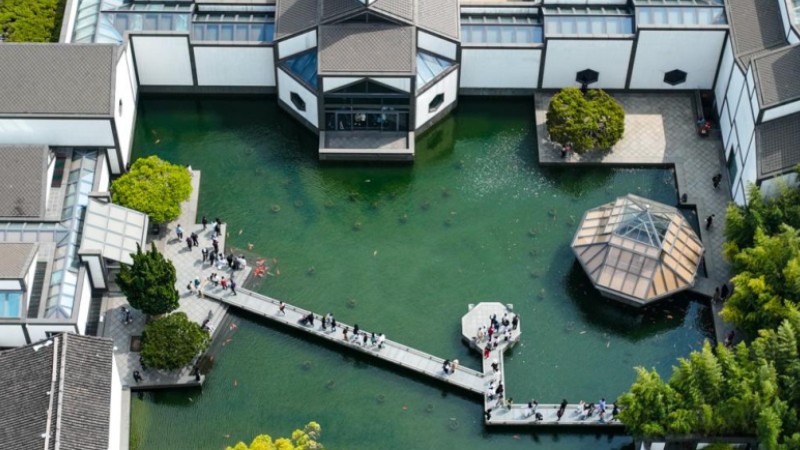China warns NATO against destabilizing Asia-Pacific
The NATO Summit communiqué released on Tuesday mentioned China much more than past summit declarations and accused the China-Russia relationship of challenging the so-called rules-based order, which shows a greater level of hostility toward China, Chinese analysts said.
They slammed the message the communiqué sends, warning that China needs to be prepared for an increased NATO presence in Asia, and said that internal divergences among the US-led alliance will also increase if it continues its unwise expansion to the rest of the world while the existing security problems in Europe are already severe.
China firmly opposes NATO's "eastward expansion" into the Asia-Pacific region, the Chinese Mission to the European Union (EU) said in a statement on Tuesday in light of the joint communiqué issued earlier in the day by leaders of NATO members after their summit which described China as a "systemic challenge."
The NATO communiqué this year claimed that "China's stated ambitions and coercive policies challenge our interests, security and values," but it also said "We remain open to constructive engagement with the PRC."
Cui Hongjian, director of the Department of European Studies at the China Institute of International Studies, told the Global Times on Wednesday that compared to the Madrid summit in 2022, which only mentioned China in one sentence of its declaration, the Vilnius communiqué mentioned China much more frequently. It presents an image of China that comprehensively "threatens" NATO in the fields of politics, security, science and technologies, as well as trade and economy.
The Chinese mission strongly rejects the claims of NATO, saying that the communiqué is filled with repetitive rhetoric echoing a Cold War mentality and ideological bias. It disregards basic facts and deliberately distorts China's stance and policies, tarnishing China's image, a statement issued by the mission read.
As a product of the Cold War, NATO has a bad track record in history. Against the backdrop of the deteriorating international security landscape, instead of reflecting on its own responsibilities, NATO, as a regional military bloc, has been making groundless accusations, meddling in affairs beyond its borders, and creating confrontation. This fully exposes NATO's hypocrisy and its ambition of seeking expansion and hegemony, the Chinese mission said.
China's warning
The statement of the Chinese mission sternly warns that China will firmly safeguard its sovereignty, security and development interests and firmly oppose NATO's eastward movement into the Asia-Pacific region, and that any action that jeopardizes China's legitimate rights and interests will be met with a resolute response.
In response to the NATO Summit declaration that accuses the China-Russia relationship of undercutting the "rules-based international order," the Chinese Foreign Ministry said on Wednesday that China-Russia relations are based on the principles of non-alignment, non-confrontation and non-targeting of third parties.
Wang Wenbin, a spokesperson of the Ministry of Foreign Affairs, said at a routine press conference on Wednesday that "We urge NATO to stop groundless accusations and provocative remarks against China," and that it should "give up the wrong approach of seeking absolute security, stop messing up Europe and stop trying to destabilize the Asia-Pacific and the rest of the world."
Li Haidong, a professor at the China Foreign Affairs University, told the Global Times on Wednesday that NATO's relations with China will be determined by the state of China-US relations because the alliance is led and deeply controlled by Washington. In the future, China needs to be prepared for an increased NATO presence in Asia and be prepared for potential threats that the US-led alliance poses toward China's national interests and sovereignty.
However, the US attempt to force its European allies to share its burden of confronting China in the Asia-Pacific has received strong opposition from major EU powers like France. The latest proof is that NATO removed a plan to establish a liaison office in Japan from the joint communiqué, according to Japanese media Nikkei Asia.
A sentence noting that NATO would continue discussions with the Japanese government toward opening a liaison office in Tokyo had survived several rounds of discussions, but was deleted in the last round of talks, a source told Nikkei Asia.
The more Washington pushes its allies to expand to the Asia-Pacific, the more divergences will emerge within the alliance, said Chinese analysts.
European countries like France prefer to pursue their own strategies on the Asia-Pacific rather than blindly following US instructions, and they view a NATO military presence in the Asia-Pacific as encroaching on their own strategies and compromising Europe's strategic autonomy, as they will be forced to follow the US in the region, Cui said.
Furthermore, if NATO establishes an office in Japan, it would be seen as a tangible sign of its eastward expansion. Such a move would certainly provoke China, and European countries do not want to become embroiled in new troubles in Asia which has nothing to do with Europe's security while the huge mess in Europe remains unsolved, experts said.
The highly sensitive word "Taiwan" was not mentioned in the NATO communiqué. A key reason why some US allies in Asia, especially Japan, feel "threatened" by China is that they are following the US to intervene in China's core interest and internal affair - the Taiwan question. Many European members of NATO such as France believed it would be very unwise to follow the US and Japan as this will put them into unnecessary danger, while these EU members are also trying very hard to have a stable, win-win relationship with China, experts noted.
Japanese Prime Minister Fumio Kishida and South Korean President Yoon Suk-yeol attended the NATO summit this year.
The Japan-NATO collaboration will go beyond traditional security areas and extend to cyber, emerging and disruptive technologies and strategic communications, Kishida said on Wednesday at the summit about Japan's recently agreed deal with NATO, called the Individually Tailored Partnership Program (ITPP), according to media reports.
Yoon also said that South Korea will increase military information sharing with NATO and participate in a NATO trust fund for assistance to Ukraine, the Yonhap News reported.
Ukraine's disappointment
Although the words "the People's Republic of China (PRC)" was mentioned 15 times in the communiqué, the Ukraine crisis is the real main deal of the summit as this is about to what extent the members of NATO should continue their economic and military support for this endless and massive geopolitical crisis, experts noted.
Ukrainian President Volodymyr Zelensky on Tuesday jolted the summit of NATO leaders by blasting their joint statement on his country's prospective membership, decrying its lack of a concrete timeline as "unprecedented and absurd," the Washington Post reported.
But on Wednesday, G7 countries have agreed a joint framework for providing long-term security pledges to Ukraine, a symbolic commitment that Zelensky said would help his country on its journey to becoming a NATO member, the Financial Times reported.
But the promises to sustain existing financial and military support to Kiev fall short of Zelensky's declared goal of winning an invitation to join the US-led military alliance and are more political gestures than concrete measures at this stage, the report said.
Cui Heng, an assistant research fellow from the Center for Russian Studies of East China Normal University, told the Global Times on Wednesday that "It's very clear that NATO has shut the door for Ukraine to join the alliance for the near future," and this once again proves that NATO only wants to use Ukraine to confront Russia, but does not want to break the rules to offer Ukraine real protection, therefore Kiev needs to consider how to realize sustainable peace and end the terrible conflict with Russia in other more effective ways.
According to the NATO Principles of Enlargement, a country applying for membership should settle its "ethnic disputes or external territorial disputes, including irredentist claims, or internal jurisdictional disputes" by peaceful means.
Based on this, Cui Heng said that Ukraine cannot meet the conditions by completely defeating Russia and regaining control of all its claimed territories which are now under Russian control, or it gives up all of these territories. Either scenario is extremely unlikely in near future.
Photos
Related Stories
- NATO-Coalition of the unwilling
- Zelensky, Biden meet at NATO summit
- NATO summit sparks global security concern, internal rifts remain
- Interview: NATO's policies are gross violation of its own charter, int'l law, says Swedish expert
- NATO summit opens in Vilnius amid protests, criticisms
- NATO summit kicks off amid ‘rising divergences, potential risks, long-standing challenges’
- Stoltenberg's term extension exposes NATO's widening splits
- Interview: NATO uses Ukraine as sacrificial pawn in defeating Russia, says German lawmaker
- Sweden moves closer to NATO entry after Turkiye deal
- NATO fails to give timetable for Ukraine membership at summit
Copyright © 2023 People's Daily Online. All Rights Reserved.









